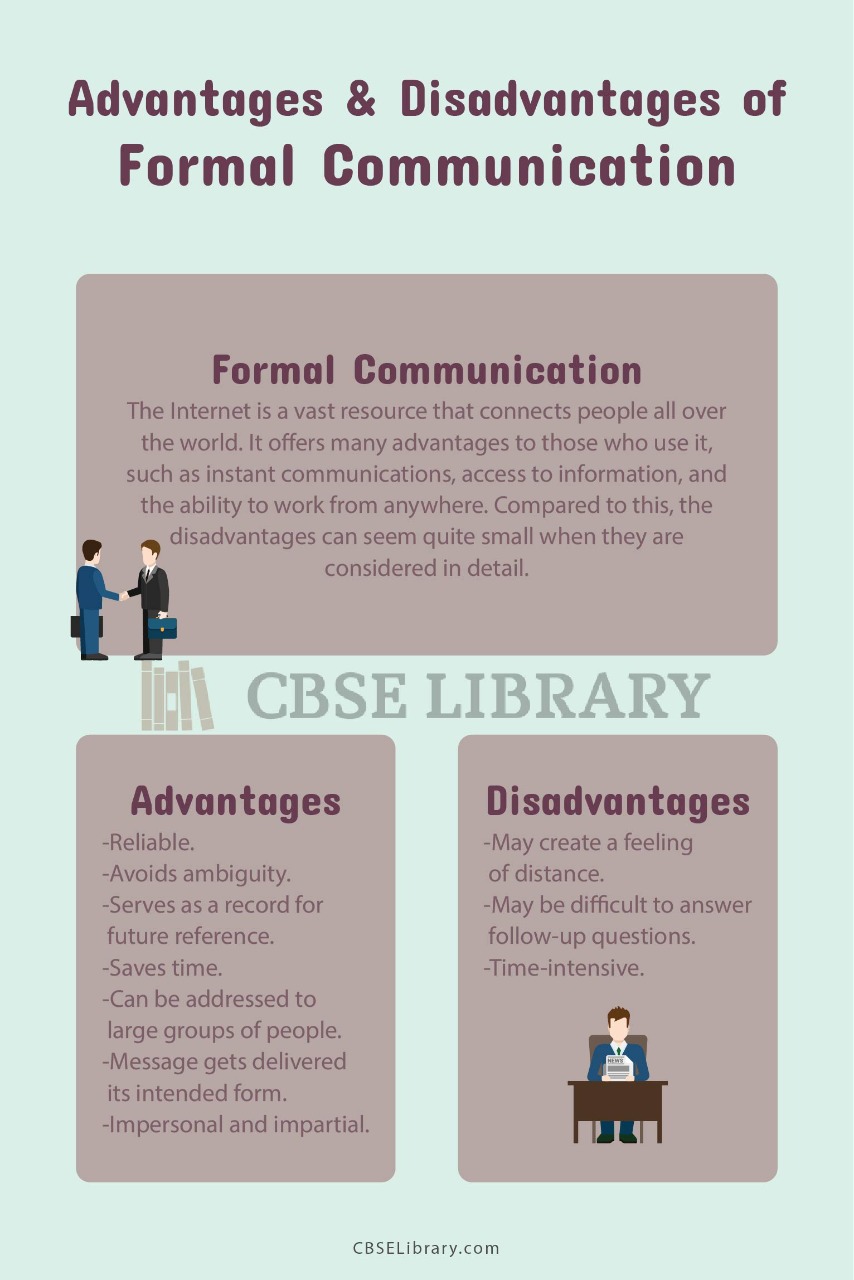Advantages And Disadvantages of Formal Communication: One of the most common forms of communication is through formal writing. This can be with an email, a text message, or a note card. When written properly, formal communication is not only a means for people to share thoughts and feelings with others but it also provides clarity and understanding that helps build trust. Here are a few tips to help you make your formal writing look good. In this article, we shall explore the importance of formal communication and its advantages and disadvantages.
But how is formal communication actually defined? Formal communication is a style of communication that includes speaking in a formal manner with respect to polite talk and business presentations. Formal communication requires the speaker to use specific guidelines such as proper grammar, diction, tone, and vocabulary. Formal communication can be beneficial to an individual because it makes them more professional. It also allows them to make a powerful impact on their audience.
Students can also find more Advantages and Disadvantages articles on events, persons, sports, technology, and many more.
Why Would Someone Want to Use Formal Communication? There are many reasons why someone might want to use formal communication, such as when they want their message to be taken seriously. Formal communication is also used when someone wants to come across as authoritative in a professional setting. Other uses of formal communication can be seen in law, and official communication in an organisation.
- Advantages of Formal Communication
- Disadvantages of Formal Communication
- Comparison Table for Advantages and Disadvantages of Formal Communication
- Conclusion on Formal Communication – Advantages And Disadvantages
- FAQs on Advantages And Disadvantages of Formal Communication
Advantages of Formal Communication
Formal communication is an important tool to use when communicating with others. It allows you to get your thoughts across and it removes ambiguity. It also helps you present yourself as a professional. Other advantages of formal communication are as follows:
- Reliable – Formal communication is reliable and provides a very clear view of what is happening. It also ensures that all the information being transmitted is accurate and consistent. Moreover, when communicating in a business setting, it is important to be as clear as possible so that you can relay your message accurately.
- Avoids ambiguity – Formal communication is beneficial because it helps people develop a thorough understanding of their conversations. When writing emails, letters, and memos, it’s important to identify the desired outcome or what you want your reader to do after reading the document.
- Serves as a record for future reference – Written formal communication is the best way to keep a record of important events, discussions or decisions. It’s important to have a written record so that you can refer back to it if there are any disagreements later on.
- Saves time – One of the top advantages of formal communication is that it saves time. In an informal conversation, people can often get off track and start talking about anything that comes to mind which takes time away from the topic at hand. Formal communication means sticking to the original topic, thus saving time.
- Can be addressed to large groups of people – Formal communication is a form of communication that is directed towards a specific audience and not limited to just a few individuals. The main advantage of formal communication is that it can be addressed to a large group of people. Another advantage is that formal communication has the potential to reach many people in your circle or even across the globe.
- Message gets delivered its intended form – Formal communication is a great way of getting your message across without confusion. For instance, if you want to inform other people about an event or a project, a formal letter would be the best option. This will help in addressing all of your recipients and ensuring that you are heard. You can also use this form when you are interviewing someone for a job and want the interviewee to know exactly what your expectations are.
- Impersonal – Big corporations often rely on formal communication, particularly with their employees. This can be beneficial so that the company’s goals are met without any miscommunication. It is also more impersonal and easy to follow, as opposed to having a personal conversation with an individual.
Disadvantages of Formal Communication
One potential disadvantage of formal communication is that a lot of the meaning is lost in translation. This means that people often don’t know what the other person is trying to say – which can lead to confusion, miscommunication, and frustration. Other disadvantages of formal communication is as follows:
- May create a feeling of distance – Formal communication can be a good strategy for certain things, but there are some disadvantages to using a formal structure. One disadvantage is that it can create a feeling of distance between you and your audience. When people are being spoken to in this way, they may not feel as connected with you. This may cause them to be less willing to engage with you or respond in the way that you want them too.
- Difficult to answer follow-up questions – A huge drawback of formal communication is the inability to answer follow-up questions. If a person feels like they have not received adequate answers, they will likely be less trusting of the other party in future interactions.
- Time-intensive – Formal communication can be time-consuming. Writing a formal email or PowerPoint presentation, preparing for a meeting, or writing up reports can take hours of your time. It is also difficult to follow along with the audience you are communicating with because of various factors.

Comparison Table for Advantages and Disadvantages of Formal Communication
Following are the advantages and disadvantages of Formal Communication:
| Advantages | Disadvantages |
| Reliable | May create a feeling of distance |
| Avoids ambiguity | May be difficult to answer follow-up questions |
| Serves as a record for future reference | Time-intensive |
| Saves time | |
| Can be addressed to large groups of people | |
| Message gets delivered its intended form | |
| Impersonal and impartial |
Conclusion on Formal Communication – Advantages And Disadvantages
Formal Communication is quite different from informal communication. It requires one to use a more acceptable language and appropriate interactions to convey ideas or information. Formal communication is also used in business settings when you need to share information with people who have differing levels of power in the organisation. You can also use formal communications when you are working within a hierarchical structure and need to make sure that everyone gets the same message.
FAQs on Advantages And Disadvantages of Formal Communication
Question 1.
What is Formal Communication?
Answer:
Formal communication is a form of verbal or written communication that involves good grammar, relevant etiquettes and being upfront and polite with people. This is different from informal communication, which is typically more casual in nature. Formal communication can be used to effectively accomplish work, such as when you are negotiating, making presentations, and writing sales proposals. There are many advantages to using formal communication for these purposes, including the ability for people to understand you better because they will be able to listen carefully and participate more efficiently.
Question 2.
What are the advantages and disadvantages of Formal Communication?
Answer:
The advantages are that it allows people to have a higher level of control over what they want others to see and read, it makes sure to get the message across accurately, and it makes it easier for people to use the same information in different ways. The disadvantages are that formal communication can be long-winded or difficult to read as the vocabulary used may not be so simple.
Question 3.
Why is Formal Communication important?
Answer:
A formal communication is a written or verbal expression that is meant to be conveyed to another party. Formal communications are often used in the workplace in order to make it clear to the reader exactly what the sender is trying to say. Additionally, a formal communication can be used as evidence if a dispute arises between two or more parties.
